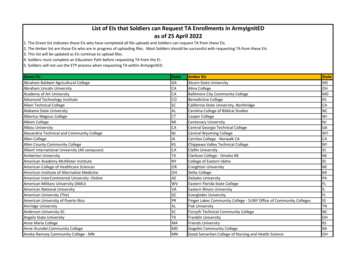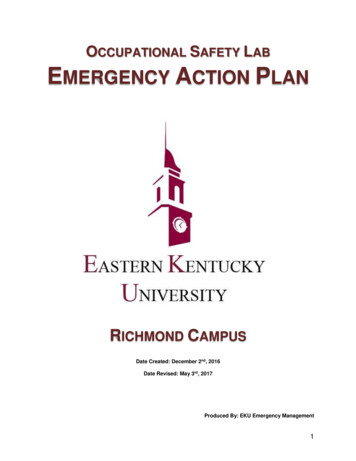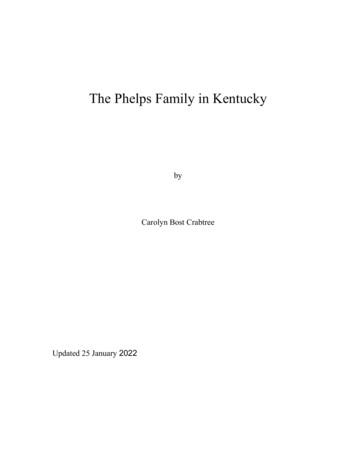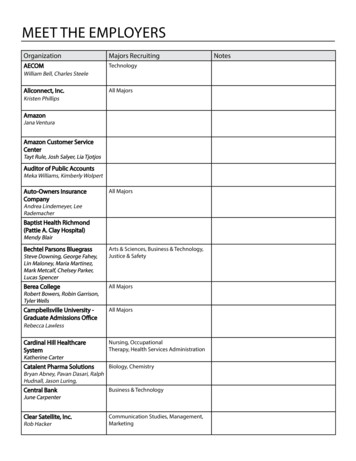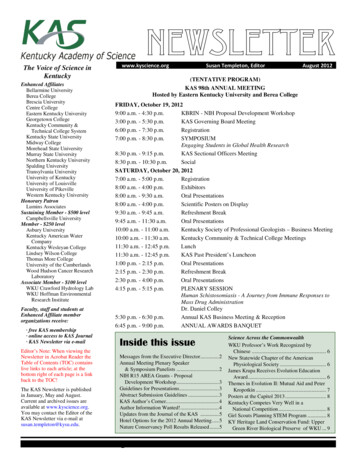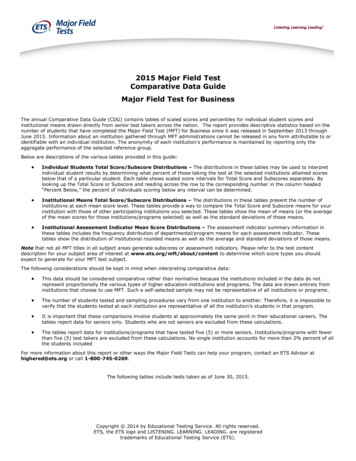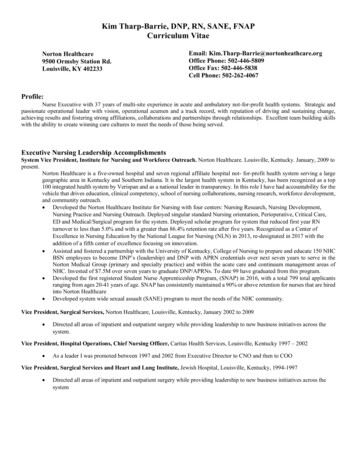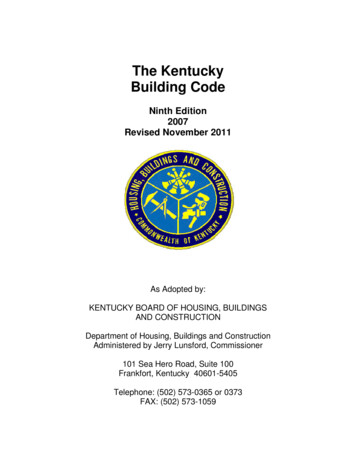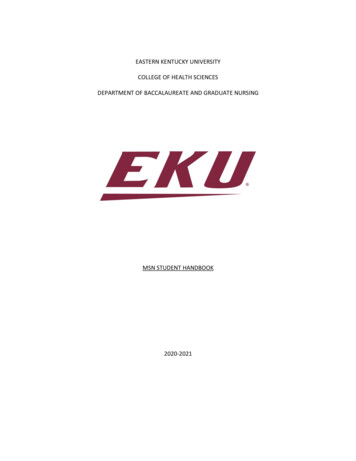
Transcription
EASTERN KENTUCKY UNIVERSITYCOLLEGE OF HEALTH SCIENCESDEPARTMENT OF BACCALAUREATE AND GRADUATE NURSINGMSN STUDENT HANDBOOK2020-2021
IntroductionThis information booklet is for those students entering Eastern Kentucky University’s Master ofScience in Nursing programs or Post-MSN certificate programs. The booklet is not intended to replacethe Graduate Catalog and the University Handbook for Students, but is provided for informationalpurposes to assist students’ entry into the completion of the MSN or Post-MSN programs in nursing.Students should always consult with their Advisor (also referred to as “Assistant Online Coordinator”),Halie Sissle (Halie.Sissle@eku.edu) FNP, Carla Patton (Carla.Patton@eku.edu) NAD and DNP, or LindseyTurner (Lindsey.Turner@eku.edu) PMHNP, to obtain the latest information, for answers to theirparticular questions, or clarification on their particular circumstances.All statements in this handbook are announcements of present policy only and are subject tochange without prior notice. Nothing contained in this publication is intended to create nor shall beconstrued as creating a contact, either expressed or implied, or guarantee for any term or for anyspecific procedures. The department reserves the right to make changes in its policies, procedures,handbook, academic curricula, informational and printed materials, and all other items wheneverneeded to fulfill and properly exercise its educational responsibilities and objectives in ensuring a qualityeducational program.Revised November 13, 2021i
Table of ContentsIntroduction . iPreamble . 1Philosophy of the Baccalaureate and Graduate Nursing Programs . 2Mission Statement of the Department of Baccalaureate and Graduate Nursing . 5Advanced Nursing Practice Outcomes . 5Professional Standards for MSN Program . 6Social Media Policy for DBGN Students 7Admission to the MSN Program. 7Graduate School Application Process . 7References . 8Deadlines for Application Submission . 9Selection of Applicants for Admission . 9Admission Requirements . 9Class Offerings. 9Relevant after Admission Information. 9Changing Concentrations after Admission . 9Delaying Enrollment. 10Bookstore Services . 10Library Research Assistance & Services . 10Information Technology Services. 10Contacting the Graduate School and the Department for Information . 11Advising and Registration . 11Course Descriptions . 12Curriculum Plans . 15Clinical Practicum Courses . 22Required Documentation. 23Professional Liability Insurance. 23Progression and Completion . 24Meeting the Graduate School and Department Requirements . 24Grading. 24Attendance. 24Withdraw from the University . 25MSN Progression, Readmission, and Reinstatement Policy . 26MSN Program Admission/Progression/Readmission/Reinstatement Committee Assignment . 27ii
Student Complaints and Grade Appeals . 28Application for Graduation . 30Advanced Health Assessment Mastery. 31Current Pharmacology . 31Evidence-based Projects for APN. 31Comprehensive Examination . 33Comprehensive Examination Rating for Candidate . Error! Bookmark not defined.Certification Exam . 37Post-MSN Certificate Information . 38Application Process . 38Deadline for Application Submission . 38Application Requirements . 38Prerequisites . 38Curriculum Plans . 38Nursing Administration Post-MSN Certificate Curriculum . 38Rural Psychiatric Mental Health Nurse Practitioner Post-MSN Certificate Curriculum. 40Rural Psychiatric Mental Health Nurse Practitioner Post-MSN Certificate- Family Curriculum . 41Progression Plan for those certified in Adult Psychiatric Mental Health. 41Progression Plan for those certified in Child/adolescent Psychiatric Mental Health . 41Appendix I . 44EKU Academic Integrity Policy . 44Appendix II . 45Communicable Diseases & Blood-Borne Pathogen Policy . 45Latex Sensitivity/Allergy Policy . 45iii
EASTERN KENTUCKY UNIVERSITYCOLLEGE OF HEALTH SCIENCESDEPARTMENT OF BACCALAUREATE & GRADUATE NURSINGPreambleEastern Kentucky University’s Baccalaureate Nursing Program was organized in 1971. In thesame year, the Meditation Chapel was dedicated and its influence can be seen in the BSN cap and pin.The program became part of the newly established College of Allied Health and Nursing in 1975. In 1995the Master of Science in Nursing Program was approved and implemented. In 1999 the college namewas changed to the College of Health Sciences.The beliefs of the faculty and students relevant to nursing and nursing program developmentare set forth in the statement of philosophy which follows. The philosophy guides the educationalprogram and learning environment, responsibilities and, accountability. The philosophy mandates thatfaculty, students, and graduates monitor the rapidly changing needs of nursing and society, and adaptphilosophically and practically to necessary changes. The precepts to be upheld and expected arecommunicated through the philosophy.The Department of Baccalaureate and Graduate Nursing within the College of Health Sciencesfunctions as an autonomous educational unit deriving the broad outlines of its aims and functions fromthe statement of purpose of Eastern Kentucky University, which emphasizes its purpose, in order ofpriority, as teaching, public service, and research. The University accepts its responsibilities to provideintellectual and cultural opportunities, to provide an understanding of humans and their aspirations, toenable effective, efficient communications; and to prepare productive and responsive citizens.1 TheCollege of Health Sciences philosophy states that identification of human values comes throughlearning, that each person has the right to define these values and to develop one’s capacity to theutmost.2 The foundations of professional nursing education—the development of intellectualcapabilities, the development of interpersonal acumen and understanding and the acquisition oftechnical skill—are congruent with the responsibilities and purposes of the University and of the Collegeof Health Sciences. Graduate nursing education at the master’s level builds on baccalaureate nursingeducation and reaffirms the philosophies and purposes of Eastern Kentucky University and the Collegeof Health Sciences.1Eastern Kentucky University Bulletin, Graduate Catalog2Philosophic Statement, College of Health Sciences1
EASTERN KENTUCKY UNIVERSITYCOLLEGE OF HEALTH SCIENCESDEPARTMENT OF BACCALAUREATE AND GRADUATE NURSINGPhilosophy of the Baccalaureate and Graduate Nursing ProgramsConsistent with the core value of Eastern Kentucky University and the College of HealthSciences, the faculty of the Department of Baccalaureate and Graduate Nursing embrace the followingbeliefs about patients, environment, health, nursing, professional nursing practice, baccalaureatenursing education, and graduate nursing education.PATIENTPatients include individuals, families, groups, communities, and populations. Each patient isunique and merits respect, support, and dignity. Patients develop and adapt in recognizable phases andpatterns. Patients continually seek meaning and purpose. Through participation in life experiences,patients grow, assume responsibility, and develop across the life span. Patients are holistic beingsintegrating biological, psychological, socio-cultural, and spiritual dimensions. The term “client” may beused interchangeably with “patient”.ENVIRONMENTEnvironment is the aggregate of all objects, conditions, forces, and ideas that interact withpatients. The elements of the environment include the physical, biological, socio-cultural, andorganizational systems. A health promoting environment facilitates movement toward wellness.HEALTHHealth is a dynamic process between the patient and environment. Optimal health includesbiological, environmental, psychological, socio-cultural, spiritual, and organizational influences. Healthreflects a patient’s ability, willingness, and resources to engage the environment in a manner thatmaximizes wellness.NURSINGNursing is an autonomous and caring profession. Nursing is an art and science that promoteshealth through patient–centered care. While respecting patients’ rights to self-determination, nursingprovides holistic care during health, illness, and death.2
BACCALAUREATE NURSING EDUCATIONPreparation for professional nursing requires the liberal and professional baccalaureateeducation. Baccalaureate nursing education develops critical thinking, collaboration, and decisionmaking. Baccalaureate graduates are prepared to function as providers of patient-centered care,designers/managers/coordinators of care, and members of a profession who are proactive in a changinghealth care system. Baccalaureate graduates must be professional, responsible, and accountable forevidence-based practice.Baccalaureate nursing education is a transformative process for students and faculty and is aprocess of reciprocal accountability and responsibility. Teaching is a cooperative, collaborative venture.Students and faculty share responsibility for the integration of experience, knowledge, and skills. Facultyserve as role models and facilitators. Graduates are prepared to pursue lifelong learning, function in avariety of health care settings and delivery models, as well as specialize at the graduate level.Revision Approved: August 19, 2009Reviewed & Updated: February 5, 20103
GRADUATE NURSING EDUCATIONPreparation for advanced nursing roles is obtained through graduate education in nursing.Graduate education in nursing further develops the intellectual skills of critical thinking, analytic inquiry,and problem solving which were initiated in baccalaureate nursing education.Building upon the foundation laid by baccalaureate education, the faculty recognizes the needfor additional knowledge to prepare graduates for specialty practice and for advanced roles. Theevaluation of theory and research in nursing and related fields is imperative for graduates to incorporateevidence-based practice into their advanced nursing roles. A higher level of synthesis, analysis, andapplication of advanced nursing knowledge is essential for performance of advanced nursing roles. Theintegration of the additional knowledge, theory, and skills is obtained through graduate education innursing. The graduate develops professional concepts and behaviors in order to function in an advancedrole.Nurses prepared at the graduate level must collaborate with other health disciplines inproviding innovative health care delivery. They do so as full partners, sharing the responsibility fordelineating society’s health goals and developing health care policy. In addition, they function asadvocates for the health care consumer who has a right to health care, regardless of social class orethnic background.The faculty recognizes the University’s rural geographic setting which creates unique health careconcerns. The faculty is committed to the education of nurses prepared at the graduate level who willcontribute to the general health of the rural population. The educational process at the graduate level iscollegial in nature and promotes independent, self-directed learning, and self-evaluation. Students arerequired to communicate the results of their discovery, analysis, and synthesis of advanced knowledgeboth orally and in writing to prepare them for their increased responsibility in making contributions tothe knowledge base of the discipline of nursing. Graduate education stimulates the learner to a lifetimeof personal and professional development. As baccalaureate education serves as the foundation forprofessional nursing practice and for graduate study in nursing, graduate education in nursing preparesthe nurse for more specialized and advanced roles in nursing. Graduate education in nursing preparesnurses to serve as advanced practice nurses, to serve in roles requiring other types of advanced nursingknowledge, and to serve as leaders in the health care system.Revision Approved 10/23/20094
Mission Statement of the Department of Baccalaureate and Graduate NursingThe mission of the DBGN is congruent with the mission of the college and university: to prepareprofessional nurses at all levels who work in interprofessional environments to promote health and wellbeing for diverse populations across the Commonwealth, country and world.(Revised Spring 2016: approved by Faculty Organization Spring 2016)Advanced Nursing Practice OutcomesGraduates of the Master of Science in Nursing program will be able to:1.Demonstrate the synthesis of expert knowledge for advanced nursing practice in diversepopulations.2.Evaluate nursing and interprofessional theory and evidence-based practice for theircontributions to advanced nursing practice and professional role development.3.Provide leadership in the appraisal and improvement of healthcare and healthcare delivery.4.Use systematic methods to design, implement, and evaluate evidence-based advanced nursingpractice.5.Participate in organizational and political systems to influence healthcare and healthcaredelivery.6.Communicate, collaborate, and consult with clients, nurses, and other professionals to meethealthcare needs of individuals and populations.7.Actively demonstrate the advanced nursing practice role.8.Integrate ethical and legal principles into advanced nursing practice.Revised Fall 20145
Professional Standards for MSN ProgramThe Essentials of Master’s Education in Nursing, published in 2011, by the American Associationof Colleges of Nursing, has been adopted as the professional standard to guide the MSN curriculumcontent as the three components of master’s education in nursing. EKU’s MSN program has reviewedthe curriculum carefully for consistency with these standards to better ensure a quality master’sprogram. The essential curriculum elements are as follows:Graduate Core Curriculum ContentI.Background for Practice from Sciences and HumanitiesII.Organizational and Systems LeadershipIII.Quality Improvement and SafetyIV.Translating and Integrating Scholarship and PracticeV.Informatics and Healthcare TechnologiesVI.Health Policy and AdvocacyVII.Interprofessional Collaboration for Improving PatientAnd Population Health OutcomeVIII.Clinical Prevention and Population Health forImproving HealthIX.Master’s-Level Nursing PracticeAdvanced Practice Nursing Core CurriculumI.Advanced Health/Physical AssessmentII.Advanced Physiology and PathophysiologyIII.Advanced PharmacologySpecialty Curriculum ContentRural Health Family Nurse Practitioner Concentration: The specialty curriculum content for the FNPconcentration uses as its standard The Criteria for Evaluation of Nursing Practitioner Programs 2016from the National Task Force on Quality Nurse Practitioner Education. NONPF’s Competencies for NursePractitioner Practice and Competencies for the Specialty concentration are used.Rural Psychiatric Mental Health Nurse Practitioner Concentration: The PMHNP concentration uses as itsstandard The Criteria for Evaluation of Nurse Practitioner Programs 2016 from the National Task Forceon Quality Nurse Practitioner Education. NONPF’s Competencies for Nurse Practitioner Practice andCompetencies for the Specialty concentrations are used.6
University Of Eastern Kentucky UniversityCollege of Health ScienceDepartment of Baccalaureate and Graduate NursingSocial Media Policy for DBGN Students:1. DBGN students must not transmit or place online individually identifiable patient or clinical agencyinformation.2. DBGN students must observe ethical and professional student-faculty and student-patient boundariesonline. Online social media contact with faculty or patients blurs these boundaries, as defined by theAmerican Nurses Association Code of Ethics (2015) and National Council of State Boards of NursingSocial Media Guidelines (2012).3. DBGN students should understand that patients, colleagues, organizations and employers may viewpostings.4. DBGN students must be aware that social networking venues are shared by patients, faculty,colleagues, and the public. Privacy settings should be utilized to separate personal and professionalinformation online.5. DBGN students should bring content that could harm a patient or student’s privacy, rights, or welfareto the attention of appropriate authorities.Admission to the MSN ProgramGraduate School Application ProcessA student seeking admission to the graduate nursing program at Eastern Kentucky University must applyfor admission to the Graduate School, http://gradschool.eku.edu/apply, indicating the desiredconcentration. The student is responsible for submitting completed materials to the Graduate School,including the Graduate School Application Form, transcripts of all previous college work (except coursework taken at Eastern Kentucky University), and a 40.00 application fee. Applications for admission tothe Graduate School are available from the Graduate School website, http://gradschool.eku.edu/.MSN Professional Statement - A Professional Statement is required for the Department of Baccalaureate& Graduate Nursing and the Graduate School. Submit a professional statement that describes thefollowing: (suggested length 500-700 words). The Professional Statement should be submitted tohttp://gradschool.eku.edu/apply. The statement is considered a very important part of your application.Faculty use the statement to evaluate your written communication skills as well as to evaluate therelationship of your career goals to those of the program. In your professional statement, you mustdescribe:1. the unique role of the advanced practice MSN-prepared nurse in your chosen concentration(PMHNP or FNP).2. how the specific nursing knowledge and skills you have gained through professional experiencewill contribute to your success in the MSN program.3. your reasons or motivations for pursuing an advanced practice degree in your chosenconcentration (PMHNP or FNP).4. your specific plans for life modification in order to successfully meet the class and clinicalrequirements in a 100% online MSN program.7
If you have any questions about the process, contact your Assistant Online Coordinator, Halie Sissle(Halie.Sissle@eku.edu), FNP, ; or Lindsey Turner (Lindsey.Turner@eku.edu), PMHNP.ReferencesSuggestions for references include supervisor/employers, professional contacts such as nursepractitioners, educators, administrators, or public health nurses who are familiar with your professionalwork experience and whose role is related to your choice of concentration; and faculty members fromyour most recent academic degree. At least one reference should be from someone in a leadership orsupervisory role. References from family members, friends, and social contacts are not consideredprofessional in nature. As part of the application, the email addresses of three references will need to beprovided. Upon submission of the application, electronic reference forms will be emailed to the emailaddresses provided. Please inform individuals submitting references that your application file cannot becompleted until these forms are received by the EKU Graduate School.8
Deadlines for Application SubmissionApplication deadlines are published on the following website, www.bsn-gn.eku.edu andhttp://onlinenursingprograms.eku.edu/.Selection of Applicants for AdmissionAttendance in the Graduate School is a privilege, not a right; therefore, an applicant is guaranteedneither admission to nor completion of the program. As a limited number of applicants are accepted foradmission, selection will be based on a careful consideration of all admission information and thedegree to which each candidate meets the requirements.Admission RequirementsMinimum requirements for admission to the program include: Baccalaureate degree in nursing from a nationally accredited program RN license from an approved state that is free and unencumbered, meaning that it has not beensubject to reprimand, revocation, probation, suspension, restriction, limitation, disciplinaryaction, discretionary review/hearing or encumbrance, nor had any type of complaint filedagainst it MSN-FNP and PMHNP applicants must have a minimum of one year of RN experience by thetime their application is submitted Undergraduate GPA of at least 3.0 (4.0 scale) cumulative Three-hour graduate or undergraduate course in statistics with a grade of “C” or higherAdmission is competitive and limited to available space. In addition to the above criteria, considerationis also given to the applicant’s professional work experience, the applicant’s goal statement, and threerequired professional references. Please refer to the Department of Baccalaureate and GraduateNursing website at http://www.onlinenursingprograms.eku.edu for specific information on theapplication process for admission and progression plans for study, contact Halie Sissle at 859-622-2517for the FNP program and Lindsey Turner at 859-622-7927 for PMHNP.Class OfferingsClasses are fully online with some synchronous classes utilizing web video conferencing technology.Students are required to have high-speed internet access or be able to travel to a site that does. It is thestudent’s responsibility to have the following throughout the online program: Adequate computer capability and compatibility, including MS Office (2010 or newer) High-speed internet connection Web camera Head set with microphoneRelevant after Admission InformationChanging Concentrations after AdmissionAfter admission, should a student desire to change to a different concentration, the student should beaware that admission to one concentration does NOT guarantee admission to the other concentration.The student will need to submit an Application to Change Concentration form. Forms are available fromyour Advisor. Applications to change concentrations will be reviewed on a competitive basis along withthe new applications.9
Delaying EnrollmentApplications for students who do not enroll in the semester for which admission is granted or whowithdraw prior to the add/drop date in their first semester course will be held by the Graduate Schoolfor one year. After that time students must reapply for admission and submit all new departmentapplication material.Bookstore ServicesBooks may be purchased through the “Official” EKU Bookstore in the Keene Johnson Building,Richmond, KY 40475-3102, Telephone: 859-622-2696, Fax: 859-622-2660, Email: ekubooks@eku.edu.Website: http://eku.bncollege.comLibrary Research Assistance & ServicesGeneral library services include: access to over 150 databases, group and individual research assistance,in-person and electronic reference assistant (http://www.library.eku.edu/ask-us), discipline-specificsubject guides (LibGuides: http://libguides.eku.edu/nursing), and assignment-based instruction viaclassroom or Blackboard.Upon request, articles, books, and other materials can be delivered to distance students via courier tothe regional campuses or mailed to their home, if needed.Resnet offers a variety of information technology resources to support and enrich your personal andacademic endeavors. Check out their website at http://www.resnet.eku.edu/ to get information onpurchasing your own computer, getting connected to the EKU network including wireless setup, accessto Blackboard (online course materials) and much more.Information Technology ServicesEvery student registered with Eastern Kentucky University has access to a free EKU email address.Students are expected to check their email address on a daily basis as many professors use this resourceas a primary contact for online classes. Use this website to activate e-mail account:https://web4s.eku.edu. Students complete online course registration using the link as well.Assistance with account set up and other technology needs is available at the EKU IT Checklist for newstudents available here: hecklist-new-students .EKU’s ITDS Helpdesk/ serves as the first point of contact for all our computing needs. Call (859) 6223000 (with phone support 24/7).10
Contacting the Gradu
DEPARTMENT OF BACCALAUREATE & GRADUATE NURSING Preamble Eastern Kentucky University's accalaureate Nursing Program was organized in 1971. In the same year, the Meditation Chapel was dedicated and its influence can be seen in the BSN cap and pin. The program became part of the newly established College of Allied Health and Nursing in 1975. In 1995
